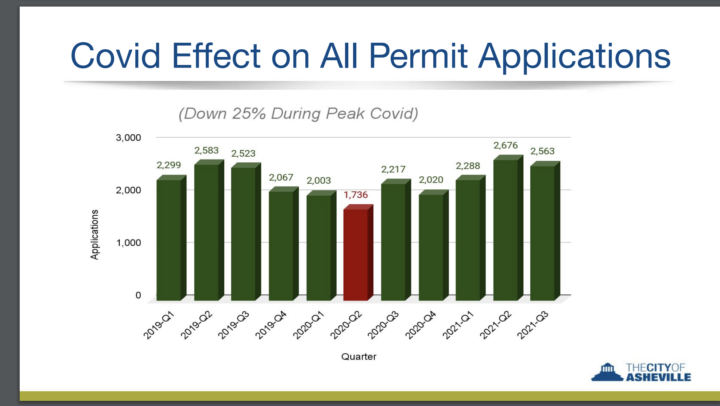At the last City Manager’s Development Forum, held in fall 2019, Asheville’s leaders in commercial and residential development discussed affordable housing, hotel construction, development trends and responsible growth.
This year’s event, the first since the start of the pandemic, covered many of the same themes, while also acknowledging the impact that COVID-19 has had on the city’s economy and housing market.
“Both residents and businesses have been impacted in many ways, including the shutdown of businesses, labor and lumber shortages, supply chain issues and many others,” said City Manager Debra Campbell. “In spite of these challenges, development activity has continued at a good pace.”
Ben Woody, Asheville’s development services director, noted that the city had received roughly 25% fewer applications for residential and commercial building and renovating permits in April through June of 2020 compared with the same period in 2019. However, permitting recovered in the following months, returning to — and in certain months, exceeding — the number of pre-pandemic applications. From April through June of this year, the number of permit applications exceeded those of the same period in both 2019 and 2020.

“In the immediate short-term of COVID, we had a really strong dip and a lot of uncertainty,” Woody noted. “But what’s really remarkable is how quickly we … turned that around,” Woody noted.
He also argued that the city’s development service portal, created to make the permitting process faster and easier, is working as intended. The portal allows residents and developers to submit applications online rather than in person. Woody explained that 93% of permits have been submitted online this year to date, compared with 31% in 2017.
Director of Planning and Urban Design Todd Okolichany then provided updates on several city initiatives, including AVL Shares Space, which permits local business owners to use public and private property to increase their outdoor space for dining, merchandise or programming. The city is considering extensions to some components of the program, while other aspects could be left in place indefinitely.
Okolichany also highlighted hotel regulations, adopted in February after an 18-month moratorium on new hotel construction, which established a hotel overlay district, design constraints and an incentive-based program that allows developers to clear projects without Council review if they contribute to equity-related public benefits. He said that city staff are developing recommendations to update the regulations and will present options to City Council during its meeting of Tuesday, Dec. 14.
“The main element that we’re looking at changing for the hotel regulations is to try to address a newer type of land use and hotel that we’re seeing called the ‘condotel,’” Okolichany explained.
In areas outside Asheville’s downtown core, Okolichany highlighted the city’s new Urban Place Zoning, approved in September, which loosens building requirements for large commercial developments if property owners add residential units. The new zoning, he said, is meant to encourage more mixed-use development and walkability in areas currently dominated by big-box stores. The first phase of urban center rezonings focused on Merrimon Avenue, Tunnel Road, Bleachery Boulevard; the next phase will examine properties along South Tunnel Road.
And Paul D’Angelo, the city’s community development director, noted that while affordable housing remains an issue in Asheville — which he attributed to stagnant wages and rising housing costs — the city is using an array of tools to work with both developers and residents to increase the number of affordable units in the city. He noted that some initiatives in the city’s pipeline for 2022, including 319 Biltmore, the Deaverview Purpose Built Communities, 50 Asheland Ave., a partnership with Haywood Street Community Development, Neighborhood Lots for Affordable Housing and working with Homeward Bound for permanent supportive housing, could contribute more than 500 affordable units.
“A healthy, affordable, mixed income community needs a variety of housing types at a variety of price points in both homeownership and rental for the variety of incomes and wages we produce in Asheville,” he said.
City Manager Campbell said that the next development forum is expected to take place in May.




Before you comment
The comments section is here to provide a platform for civil dialogue on the issues we face together as a local community. Xpress is committed to offering this platform for all voices, but when the tone of the discussion gets nasty or strays off topic, we believe many people choose not to participate. Xpress editors are determined to moderate comments to ensure a constructive interchange is maintained. All comments judged not to be in keeping with the spirit of civil discourse will be removed and repeat violators will be banned. See here for our terms of service. Thank you for being part of this effort to promote respectful discussion.